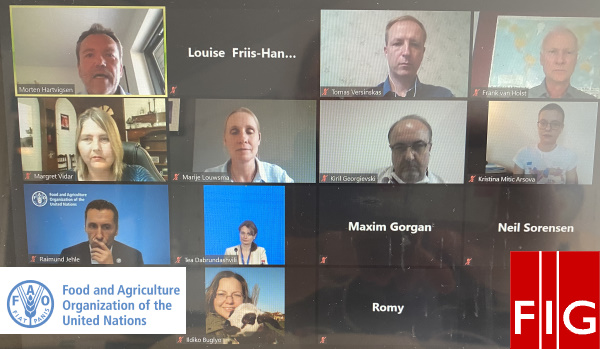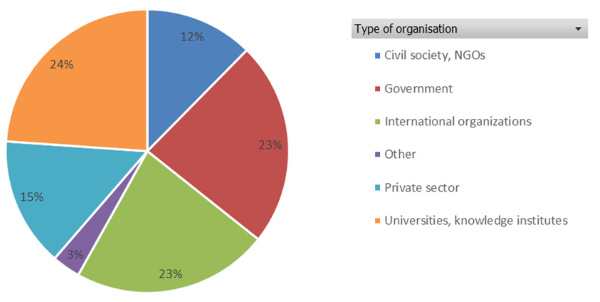

News in 2020
|
More than 550 people from across the world took the opportunity to learn about land consolidation, the legal framework, and its implementation at the country level. The successful webinar was jointly organised by FIG and FAO on 18 June. Originally, two sessions about land consolidation and the implementation at country level were planned for the FIG Working Week 2020 in Amsterdam (May 2020). Since the FIG Working Week had to be cancelled, FAO and FIG jointly agreed to organise a webinar to replace the two sessions initially planned.
FIG was represented by chair of FIG Commission 8 Marije Leuwsma. The webinar was competently moderated by Morten Hartvigsen, FAO.

The presenters and panellists at the webinar
Land consolidation is a well-proven land management instrument, which has traditionally been used for agricultural development with a main objective of reducing land fragmentation and increasing holding and farm sizes. In the last decades, countries in Western Europe have developed land consolidation into a multi-purpose instrument with a broader objective. Multi-purpose land consolidation can facilitate the implementation of projects related to nature restoration, climate change adaptation and mitigation and large-scale infrastructure projects where land consolidation provides an opportunity to compensate landowners and farmers in land instead of monetary compensation.
After the introduction of the Legal Guide on Land Consolidation by Margret Vidar (FAO), panellist discussed the implementation of land consolidation at the country level (e.g. North Macedonia, Azerbaijan, Lithuania, Armenia). Based on the experiences of the panellists, various recommendations and considerations were shared about the scope of land consolidation, safeguarding the rights of land owners and users, the ‘at least as well of principle’ and how to secure these in law.
From the audience many interesting questions to the panel were raised. Addressed questions related to the application of land consolidation for urban or peri-urban areas, how inheritance influenced land fragmentation, how to include women’s rights, how to deal with leased land, diverse farmers’ strategies regarding land fragmentation, how to apply land consolidation in customary tenure systems etc. Questions that could not be discussed in the webinar will be answered and become available later. Based on the raised questions, we can conclude that there is much interest for land consolidation in various countries across the world, and with paying respect to general principles of good governance.
Were you not able to join live? You can watch the webinar now on YouTube.
More information, including background literature, can be found on the Land Portal website. Here, you can also share your view on and experiences with land consolidation on three different topics:
Figure 1 Region from where participants joined:

Figure 2 Type of organisation - of participants:

Marije Leuwsma
22 June 2020